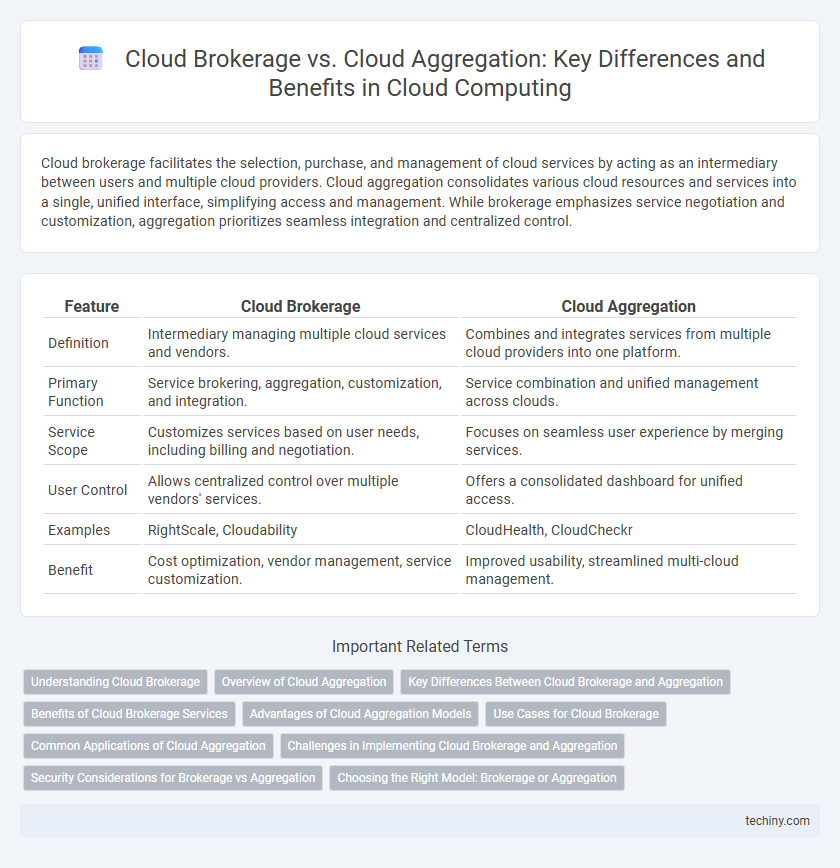Cloud brokerage facilitates the selection, purchase, and management of cloud services by acting as an intermediary between users and multiple cloud providers. Cloud aggregation consolidates various cloud resources and services into a single, unified interface, simplifying access and management. While brokerage emphasizes service negotiation and customization, aggregation prioritizes seamless integration and centralized control.
Table of Comparison
| Feature | Cloud Brokerage | Cloud Aggregation |
|---|---|---|
| Definition | Intermediary managing multiple cloud services and vendors. | Combines and integrates services from multiple cloud providers into one platform. |
| Primary Function | Service brokering, aggregation, customization, and integration. | Service combination and unified management across clouds. |
| Service Scope | Customizes services based on user needs, including billing and negotiation. | Focuses on seamless user experience by merging services. |
| User Control | Allows centralized control over multiple vendors' services. | Offers a consolidated dashboard for unified access. |
| Examples | RightScale, Cloudability | CloudHealth, CloudCheckr |
| Benefit | Cost optimization, vendor management, service customization. | Improved usability, streamlined multi-cloud management. |
Understanding Cloud Brokerage
Cloud brokerage acts as an intermediary that manages multiple cloud service providers to tailor and optimize cloud solutions for businesses, ensuring cost efficiency and seamless integration. It offers services such as cloud service aggregation, customization, and integration, helping organizations select the best mix of public, private, or hybrid cloud offerings. Understanding cloud brokerage is essential for leveraging expert management of multi-cloud environments to reduce complexity and enhance agility in cloud adoption.
Overview of Cloud Aggregation
Cloud aggregation involves integrating multiple cloud services from various providers into a unified platform, allowing seamless access and management through a single interface. This approach simplifies complex cloud environments by consolidating resources, enhancing service delivery, and improving operational efficiency. Key benefits include optimized cost management, streamlined workflows, and enhanced scalability across multi-cloud deployments.
Key Differences Between Cloud Brokerage and Aggregation
Cloud brokerage involves managing multiple cloud services from various providers, enabling users to integrate, customize, and optimize these services to meet specific business requirements. Cloud aggregation consolidates services from diverse cloud platforms into a unified interface, simplifying access and billing without extensive customization. Key differences include the level of service management and customization in brokerage versus the streamlined service delivery and cost efficiency emphasized in aggregation.
Benefits of Cloud Brokerage Services
Cloud brokerage services enhance cloud adoption by simplifying vendor management, enabling businesses to optimize costs through tailored service selection and consolidated billing. These services provide centralized control over multi-cloud environments, improving operational efficiency and ensuring compliance with organizational policies. By offering specialized expertise, cloud brokers facilitate seamless integration and migration, reducing deployment risks and accelerating time-to-value.
Advantages of Cloud Aggregation Models
Cloud aggregation models consolidate multiple cloud services into a unified platform, simplifying management and reducing operational complexity for businesses. This approach enhances cost efficiency by enabling bulk purchasing and optimizing resource allocation across diverse providers. Aggregation also improves scalability and flexibility, allowing seamless integration and rapid deployment of cloud resources tailored to dynamic business needs.
Use Cases for Cloud Brokerage
Cloud brokerage facilitates seamless integration and management of multiple cloud services, enabling businesses to optimize costs and improve service quality by selecting the best providers for specific workloads. Use cases include hybrid cloud deployment, where brokers simplify the orchestration between private and public clouds, and multi-cloud strategy execution to avoid vendor lock-in while enhancing redundancy. Enterprises leverage cloud brokerage for automated governance, compliance monitoring, and dynamic resource allocation across diverse cloud environments.
Common Applications of Cloud Aggregation
Cloud aggregation simplifies access to multiple cloud services by integrating various providers into a single platform, commonly used in hybrid cloud management, multi-cloud cost optimization, and centralized security compliance. It enables businesses to streamline service delivery across public and private clouds, enhancing flexibility and scalability. Enterprises leverage cloud aggregation for unified monitoring, automated resource provisioning, and consolidated billing to improve operational efficiency.
Challenges in Implementing Cloud Brokerage and Aggregation
Implementing cloud brokerage faces challenges such as ensuring seamless integration across multiple cloud providers and managing complex service-level agreements to maintain consistent performance. Cloud aggregation struggles with data synchronization issues and the difficulty of providing unified security policies across diverse cloud environments. Both require advanced automation and governance frameworks to address scalability and compliance in multi-cloud deployments.
Security Considerations for Brokerage vs Aggregation
Cloud brokerage providers manage multiple cloud services, requiring robust security controls such as data encryption, identity and access management, and compliance monitoring to mitigate risks associated with integrating diverse platforms. Cloud aggregation focuses on consolidating cloud services into a unified interface, necessitating strong data protection measures and secure API management to prevent vulnerabilities during service aggregation. Both models demand rigorous security frameworks, but brokerage places greater emphasis on trust relationships and access governance, while aggregation prioritizes secure data flow and service interoperability.
Choosing the Right Model: Brokerage or Aggregation
Choosing the right cloud service model depends on organizational needs for flexibility and control; cloud brokerage offers tailored service mediation and integration across multiple cloud providers, enhancing customization and value-added services. Cloud aggregation consolidates various cloud services into a unified access point, simplifying management and ensuring seamless user experience without deep customization. Prioritizing cloud brokerage suits businesses needing complex service orchestration, while cloud aggregation fits enterprises seeking streamlined access and simplified vendor management.
Cloud Brokerage vs Cloud Aggregation Infographic

 techiny.com
techiny.com